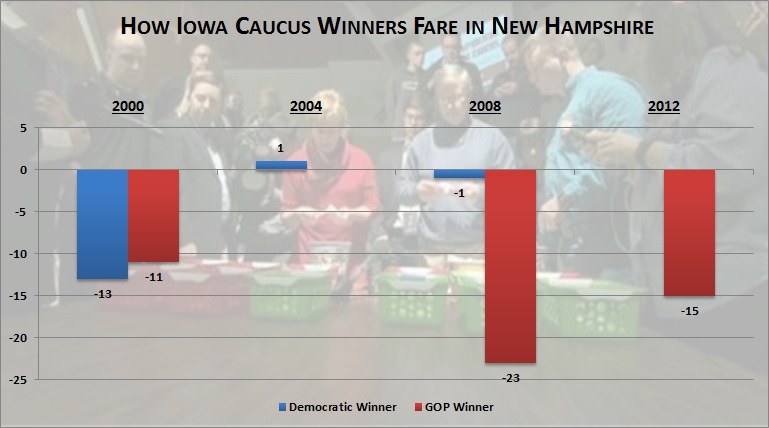Donald Trump’s days are numbered.
Like so: -11, 4, 21, and 45,416.
These four figures help explain why the favorite for the New Hampshire Republican primary hasn’t been knocked from his perch just yet, despite the victory of Ted Cruz in the Iowa caucuses and the surge of Marco Rubio. An argument against Trump’s frontrunner status is that Rubio has all the momentum from his strong Iowa finish, and that the real estate mogul no longer has the air of inevitability. (“He’s not a machine! He’s a man!“)
Both of those statements might be true. But so are these: Trump’s base of support is formidable and committed, as Jonathan Last notes, even if polls may have overstated its size; and his position in New Hampshire has been strong for months.
Let the numbers show you how:
45,416
Trump may have clung to a second-place finish in Iowa, but he still garnered a historically large amount of votes. He received more than Rick Santorum and Mike Huckabee did when they actually won the Iowa caucuses in the last two elections. Trump, in fact, exceeded Santorum’s total by more than 15,000. The GOP frontrunner didn’t lack for support in volume.
On the other hand, neither did his chief rivals Cruz and Rubio, who both fared well amid record turnout—evidence that many caucus goers also turned out against Trump.
-11
The prevailing wisdom is that New Hampshire is more favorable to Rubio than Cruz, the latter of whom appealed to a culturally conservative Iowa electorate that doesn’t resemble the one in New Hampshire. Even if that’s the case, Cruz has emerged as a clear alternative to Trump, and he’s been part of the logjam in the Granite State vying for second place in the polls. It stands to reason that Cruz will be a major challenger for the nomination, and that he could benefit from the same kind of post-Iowa “momentum” that favors Rubio.
It’s worth looking, then, at how past Iowa caucus winners have fared in the New Hampshire primary. I’ve added Democratic results, just for the sake of displaying the additional data. (The differences between GOP voters in Iowa and New Hampshire are not the same as those of Democratic voters.)

The best that a recent winner of the Republican caucus did in New Hampshire was 11 points worse.
Simply put, it takes another formula—and perhaps another kind of candidate—to win in Iowa than it does in New Hampshire. George W. Bush, Mike Huckabee and Rick Santorum were the past three Republican victors in the Hawkeye State, and all three were very conservative, deeply religious Christians. Contrast that with the winners of the last three contested New Hampshire primaries, John McCain and Mitt Romney. The former sported his reputation as a “maverick”. The latter was a pro-choice politician once upon a time.
21
It’s evident that polls can be unreliable forecasts of election results. But they’re at least approximations, providing a ballpark estimate of a candidate’s standing. With the numbers so close before the Iowa caucuses, Trump could have been considered only a modest frontrunner.
But in New Hampshire, he’s led by an average of 21 percentage points. In statistics speak, it’s safe to say that this is outside the margin of error. In a survey from Harper Polling released Wednesday, Trump had a 17-point advantage over his closest competitor. A tracking poll from the University of Massachusetts Lowell has showed him ahead by at least 24 points the last three days.
This is significant—statistically significant.
4
If Trump had a clear number-one contender to deny him victory in New Hampshire, we might have to reevaluate his vulnerability. But as of Wednesday, he’s still a mile clear of four candidates polling between the high-single digits and low double-digits: Cruz, Rubio, John Kasich and Jeb Bush. In the Harper and UMass Lowell results, none of those candidates netted more than 14 percent of the vote. That’s similar to nearly two dozen surveys of the state in January, only one of which revealed someone other than Trump exceeding 17 percent. (It was John Kasich, in mid-January.)
It’s possible that someone could break from the pack in the next few days. But based on the data we have, Trump’s lead in New Hampshire remains large and resilient, in part because no single candidate has made a move to challenge it.
Of course, none of these numbers is part of a statistical model, like the one FiveThirtyEight has put together. They’re just individual bits of data that point in a similar direction.
The FiveThirtyEight forecast has Trump pegged as a 60 percent favorite next Tuesday. But it also had Trump as a 46 percent favorite in Iowa, before Cruz upended him.
Talk to anyone who has ever placed a bet in Vegas—upsets happen. As of today, any result but a Trump victory would have to be considered an upset.

